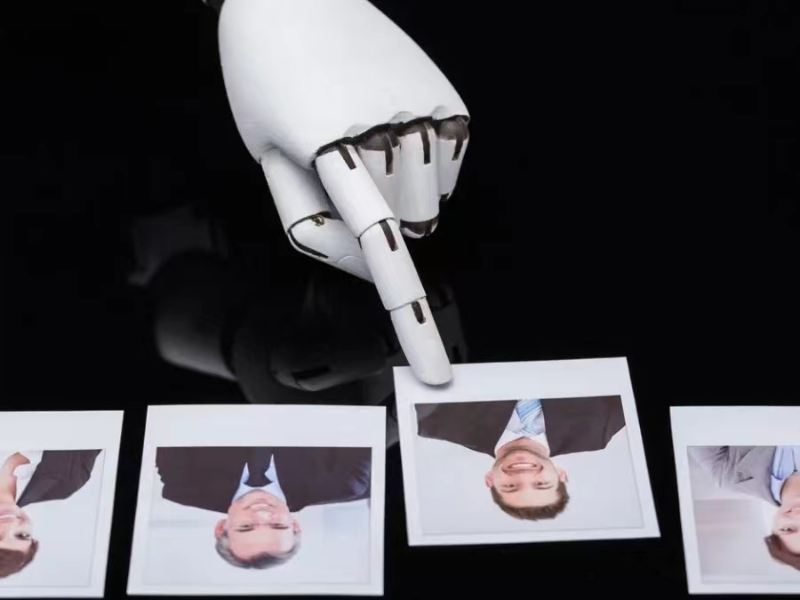- As technology continues to evolve, so does the way companies recruit top talent. One of the most notable changes in recent years has been the rise of AI interviewers.
- By understanding the technology, practising effective communication, and maintaining authenticity, you can confidently tackle AI interviews and advance your career.
OUR TAKE
AI interviewers, while promising impartiality, often perpetuate hidden biases and make snap judgments based on superficial data from brief interviews, losing the essence of human connection and innovation. However, there are skills to excel in an AI interview. For example, research the platform used by the employer and practise with mock interviews. Remember, although AI interviewers handle initial screenings, it is human recruiters that make the final evaluations.
–Ashley Wang, BTW reporter
Last month, I’ve been interviewed by a special employer. She was an elegant lady with a gentle voice and temperament. During the interview, she always smiled and waited patiently for my answer. Despite the friendly atmosphere, I was still more nervous about the interview than I had ever been before. As for the reason? She was an AI avatar.
As technology continues to evolve, so do the methods by which companies recruit top talent. One of the most significant changes in recent years is the rise of AI interviewers. These digital interviewers use sophisticated algorithms and natural language processing(NLP) to assess candidates, making the hiring process more efficient and objective.

However, for job seekers, this new format can be daunting. Different from the traditional interview which will have abundant experiences to follow. The newly emerged technology presents a distinct pattern within which there are scarce skills to get through. How to beat an AI interviewer? There are some tips you should grasp.
Mechanisms of AI in recruitment
The realm of recruitment has witnessed a paradigm shift in recent years, with the advent and proliferation of AI interviewing. For companies looking to streamline their hiring processes, this technology has revolutionised the way they screen and assess candidates, streamlining processes and enhancing the overall efficiency of the hiring cycle. Popular platforms like HireVue, Pymetrics, and myInterview use AI to analyse candidates’ responses, facial expressions, and even vocal tones to evaluate their suitability for a role.
“The Pre-interview Video was very valuable to give all qualified candidates an opportunity to interview and be evaluated with a practical lens focused on their skills, experience, capabilities and presence relevant to the position. Overall our experience was great and very valuable to accomplish our goals of recruitment, deeper candidate evaluation, streamlining the process, and saving time.”
Bernell Ingram, owner of Visions International
To fully grasp how to succeed in an AI interview, it’s essential to understand the mechanics behind these systems.
Initial setup and preparation
After applying for a job, candidates receive an invitation to participate in an AI interview. This usually comes via email and includes instructions on how to access the interview platform. Candidates are advised to use a device with a good internet connection, a functional camera, and a microphone. Ensuring a quiet and well-lit environment is also recommended.
Also read: Aespa’s merging of AI and reality points to the future of entertainment
Conducting the interview
By logging in to the AI interview platform at the scheduled time, candidates are typically provided with a brief overview of what to expect, including the types of questions and the estimated duration of the interview. The AI system will present a series of questions one at a time. These questions are pre-recorded or text-based and are designed to assess various competencies and skills relevant to the job.
Candidates answer these questions just like the similar step in the traditional interview. When they are in response, of course, the AI interviewer will not interrupt. But, there is usually a time limit for each response, which requires candidates to be concise and to the point. The answers will be recorded in audio and video, based on which the next step can be taken.
Analysing by AI interviewer
The job of applicants has ended. The following is the stage for AI. There are specific techniques that help make decisions The recorded responses are analysed using NLP algorithms. These algorithms assess the content of the responses, looking for specific keywords, phrases, and concepts that align with the job requirements.
Beyond the content, AI systems evaluate the way participants speak by adopting speech and tone analysis. This includes assessing the tone, pace, and clarity of speech. Certain systems can identify confidence levels, enthusiasm, and professionalism based on vocal cues.

The facial expression has been taken into account in the latest interview pattern. Advanced AI platforms incorporate facial recognition technology to analyse non-verbal cues. This includes tracking facial expressions, eye movements, and other micro-expressions to gauge emotional responses and sincerity.
AI interviewers go a step further by evaluating body language. By assessing posture, gestures, and overall body movements, Some AI interviewers can provide insights into a candidate’s confidence and engagement.
After all the above steps are finished, the special interviewer will score and feedback. In its algorithmic scoring system, the AI compiles the data from the NLP, speech and tone analysis, facial expression recognition, and body language assessment to generate a comprehensive score for each applicant. This score is based on how well their responses match the desired profile for the job. Apart from scoring, a comparative analysis system may compare the interviewees’ performance against a database of previous successful applicants to predict their suitability for the role.

Feedback generation decides whether the offer for the next round of interviews will be provided. Some platforms have immediate feedback to interviewees, highlighting areas of strength and opportunities for improvement. This can be valuable for job seekers to understand how they performed and where they can improve for future interviews.
How to succeed in AI interview
Technical familiarity
One of the first steps to acing an AI interview is becoming familiar with the technology itself.
Understanding the specific AI platform your prospective employer is using can give you a significant advantage. Each system has unique features and functionalities, so researching the platform can help you prepare effectively. Look for tutorials or guides on platforms like HireVue, Pymetrics, or myInterview to gain insights into their specific processes.
Many online tools offer mock AI interviews that simulate the real experience. Practicing with these can help you become comfortable with the format and identify areas for improvement. Websites like Interviewing.io and Pramp offer practice sessions with AI feedback, allowing you to fine-tune your responses and presentation.
Clear and concise communication
Effective communication is crucial in any interview, but it’s even more important when dealing with an AI system.
AI systems favour structured responses that are easy to analyse. The STAR method-Situation, Task, Action, Result-is a great way to organise your answers. By clearly outlining the context of your experience, the specific task you were responsible for, the actions you took, and the results you achieved, you provide a comprehensive and coherent response that AI can easily interpret or AI will less likely to confuse.
“Candidates can best prepare for an interview by taking advantage of a practice recording provided ahead of the interview and any retries provided during the interview.”
Lindsey Zuloaga, HireVue’s chief data scientist
While it might be tempting to use industry-specific jargon to demonstrate your expertise, it’s better to use straightforward language. AI systems can sometimes struggle with niche terminology, which might lead to misinterpretation of your responses. Aim for clarity and simplicity to ensure your answers are understood correctly.
Pop quiz
Which of the following is the “S” in the STAR method?
A. Strategy
B. Skill
C. Situation
D. Schedule
The correct answer is at the bottom of the article.
Body language and presentation
Non-verbal cues play a significant role in communication, and as technology advances, especially video, AI interviewers are designed to analyse these aspects as well.
Looking directly at the camera simulates eye contact, which is interpreted by AI as a sign of confidence and engagement. Position your camera at eye level and avoid looking away from the screen too often.
Smiling and using natural facial expressions can convey enthusiasm and positivity, qualities that are often evaluated by AI systems. Practice maintaining a pleasant and approachable demeanour throughout the interview.
Adaptability and flexibility
Ai interviews sometimes throw unexpected questions to test your problem-solving skills and adaptability, such as customised questions based on your answer to a previous question.
Be prepared for unusual or complex questions that might not be directly related to the job role. These questions are designed to assess your critical thinking and adaptability. Stay calm and take a moment to think before responding.
Also read: ‘City not city’: Foreign blogger’s charming TikTok vid goes viral
Authenticity and honesty
AI systems are designed to detect inconsistencies and rehearsed answers, so it’s important to be genuine. While it’s important to prepare, avoid over-rehearsing your responses. AI systems can pick up on overly scripted answers, which might come across as insincere. Aim to be authentic and let your personality shine through.
Use the interview as an opportunity to highlight your unique traits and experiences. Authenticity can help you stand out from other candidates and leave a positive impression.
Technical setup and environment
Apart from all the inner qualities that need to cultivate, you should prepare for the external factors as well.
The technical setup of your interview environment can significantly impact your performance. A well-lit, distraction-free environment creates a professional impression. Ensure your face is clearly visible by positioning a light source in front of you, and choose a neutral background to avoid distractions.
Check your camera, microphone, and internet connection before the interview to avoid technical issues. Conduct a test run with a friend or family member to ensure everything is working smoothly.
“If you learn keywords, you’ll have quicker mental shortcuts to get to the info you want when the screen asks you the information.”
Zahira Jaser, associate professor at the University of Sussex Business School
Common pitfalls to avoid
An overthinking responses creates a fake atmosphere that will be perceived even the interviewer is not a person.While it’s important to be thoughtful in your answers, overthinking can lead to overly complex or unnatural responses. Aim for a balance between thoroughness and spontaneity to ensure your answers are clear and authentic.
Neglecting the technical setup of your interview environment can create unnecessary distractions and stress. Ensure your equipment and environment are prepared to allow you to focus on delivering your best performance.
Human element in AI interviews
While AI interviewers offer numerous benefits, we should bear in mind that they are not meant to replace human recruiters entirely. It is true that their functions get strengthened during the past years, but what they can do is just complement human judgement, providing a more holistic approach to candidate evaluation.
In a word, AI can handle the initial screening, but human recruiters play a vital role in final evaluations. AI interview is augmentation, not replacement.
AI interviews are transforming the recruitment landscape, offering both opportunities and challenges for job seekers. By developing the right skills and embracing continuous learning, candidates can navigate this new terrain with confidence and poise.
As AI technologies continue to evolve, staying adaptable and informed will be key to achieving success in the modern job market. Embrace the future of recruitment and master the machine to unlock your full potential.
The correct answer is C. Situation
